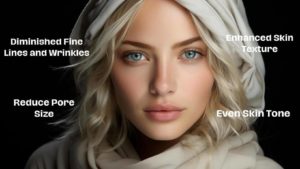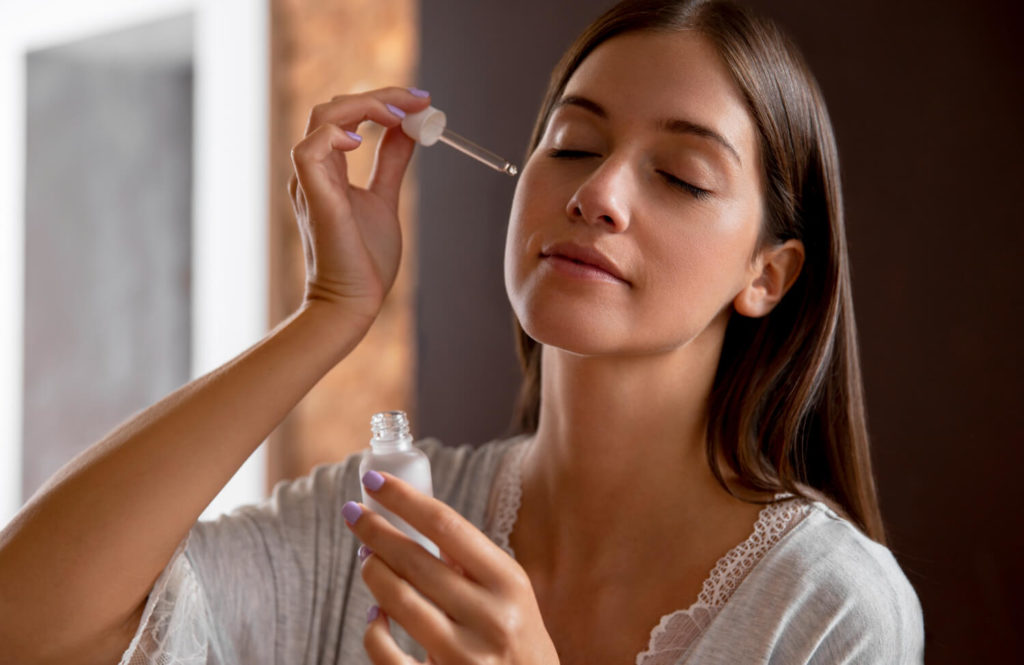Retinol, a derivative of Vitamin A, has long been heralded as a cornerstone in anti-aging skincare. Revered for its multifaceted benefits, retinol is more than just a trend; it’s an age-defying elixir that promises to rejuvenate and transform the skin. In this comprehensive blog, we delve into the science of retinol, explore its benefits, address common concerns, and highlight how to effectively incorporate it into your skincare routine.
What is Retinol?
Retinol is a type of retinoid, derived from vitamin A. It’s renowned for its ability to accelerate skin renewal, boost collagen production, and reduce the appearance of fine lines, wrinkles, and hyperpigmentation. Unlike stronger prescription retinoids like tretinoin, retinol is available over the counter and is well-tolerated by most skin types.
The Science Behind Retinol
When applied topically, retinol converts into retinoic acid, which interacts with skin cells to trigger a variety of rejuvenating processes. It encourages cell turnover, revealing fresher, more youthful skin. Additionally, retinol is known to stimulate the production of new blood vessels, improving skin color and tone.

Benefits of Retinol:
1. Anti-Aging:
Retinol’s most notable benefit is its ability to diminish the signs of aging. It reduces the visibility of fine lines and deep wrinkles by boosting collagen production.
2. Skin Texture and Tone:
Regular use of retinol can lead to smoother skin and an even complexion, thanks to its exfoliating properties.
3. Acne and Pore Size Reduction:
Retinol helps unclog pores and reduce acne outbreaks. Over time, it can also decrease pore size and control oil production.
4. Hyperpigmentation and Sun Damage Repair:
Retinol can aid in hyperpigmentation, fade age spots and repair some of the visible damage caused by sun exposure.
Incorporating Retinol into Your Skincare Routine
To effectively incorporate retinol into your skincare routine, start with a lower concentration, especially if you’re new to retinoids. Apply it at night, as retinol can make your skin more sensitive to sunlight. Always follow up with a broad-spectrum sunscreen during the day.
Combining Retinol with Other Skincare Ingredients
While retinol is powerful on its own, combining it with other skincare ingredients can enhance its benefits. Hyaluronic acid and ceramides can help offset dryness, while niacinamide can address redness and irritation. However, avoid using retinol with vitamin C or exfoliating acids at the same time to prevent irritation.
Potential Side Effects
Common side effects include dryness, redness, and flaking, especially during the initial weeks of use. These usually subside as your skin adjusts to the treatment. Always conduct a patch test before applying retinol broadly.

Retinol for Different Skin Types
Retinol is beneficial for various skin types, but the approach may differ. For sensitive skin, opt for retinol formulations designed for sensitive skin or retinol derivatives like retinyl palmitate. Oily skin types may tolerate higher concentrations of retinol better.
Latest Research and Innovations in Retinol Skincare
Recent advancements in retinol formulations aim to deliver the same benefits with reduced irritation. Encapsulation technology, for instance, releases retinol slowly, minimizing the potential for skin irritation. Newer, gentler retinol derivatives are also being developed to cater to more sensitive skin types.
Sustainable and Ethical Considerations in Retinol Production
As with any skincare ingredient, the ethical sourcing and sustainability of retinol are vital. Opt for products from brands committed to ethical practices and sustainable sourcing.
Conclusion:
Retinol remains a gold standard in skincare for its unparalleled ability to combat the signs of aging and improve skin health. With a mindful approach to its application and a keen eye on product formulation, retinol can be a transformative addition to your skincare regimen. As the beauty industry continues to evolve, retinol’s standing as an age-defying elixir only grows stronger, promising brighter, more youthful skin for those who harness its power.
Retinol in Skincare FAQ-
What Are the Benefits of Using Retinol in My Skincare Routine?
The benefits of retinol include diminished wrinkles, improved skin texture, sun damage repair, and acne control. It's a versatile ingredient that addresses multiple skin concerns.
How Should I Incorporate Retinol Into My Skincare Routine?
Start with a lower concentration, apply at night, and always wear sunscreen during the day. Hydration and patch testing are also crucial to maximize retinol's benefits.
Can Retinol Be Used by All Skin Types and Ages?
Retinol is generally suitable for various skin types and ages, but its concentration and usage may vary. It's advisable to consult a dermatologist for personalized guidance.
Are There Any Side Effects or Precautions When Using Retinol?
Potential side effects include dryness, flakiness, and sensitivity to the sun. Beginners should start slowly and perform a patch test. Sunscreen is essential when using retinol to protect the skin from sun damage.


Pingback: Gender-Specific Skincare: Men's Skincare Vs Women's - Wild Oak Skincare
Pingback: Your Top 10 Tips for a Sizzling Skincare Routine in Summer - WildOak
Pingback: Top Skincare Ingredients and Beauty Trends in 2024- Wild Oak
Pingback: Squalane Benefits in Skincare: Hydrate & Revitalize Your Skin | Essential Guide
Pingback: Viral Skincare Combos You Shouldn’t Miss This Season - Wild Oak Skincare
Pingback: Understanding Retinol Vs Retinoids: Benefits and Differences - Wild Oak Skincare